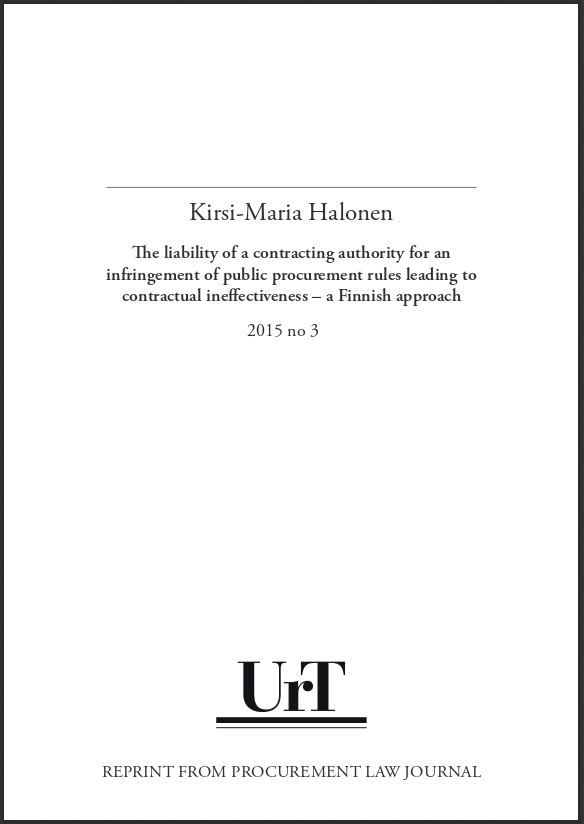New Publication by Kirsi-Maria Halonen on Aggregation Rules under Public Procurement Law
A new publication was released by Kirsi-Maria Halonen, Characteristics of Separate Operational Units – A Study on Aggregation Rules under Public Procurement Law. It is a report for the Swedish Competition Authority, and can be downloaded here. The concept of separate operational unit was introduced in 2014 Procurement Directives, but the directives provided very little guidelines on its interpretation or application. According to the 2014 directives a contract value can be based at the level of a single unit operating within a contracting authority in case it is independently responsible for its procurement. The Swedish Competition Authority requested the EPLG member Kirsi-Maria Halonen to look into the matter and in February…
Disclosure Rules In EU Public Procurement – Balancing Between Competition and Transparency
K-M.Halonen, Disclosure Rules In EU Public Procurement – Balancing Between Competition and Transparency, peer-reviewed, the Journal of Public Procurement, Vol. 16, Number 4, Winter 2016, pp. 528–553.
Is the remedy of contractual ineffectiveness truly effective in Finland?
The principle of effectiveness is one of the fundamental principles in EU law. Even though the principle ensures the effectiveness of all EU legislation, it also has a key role in the interpretation of EU procurement rules. The Cour of Justice of the European Union has often address the principle of effectiveness in its case law and has consistently held that, in the absence of EU rules governing the matter, it is for every member state to lay down the detailed rules of administrative and judicial procedures for safeguarding rights, which individuals derive from EU law.
The liability of a contracting authority for an infringement of public procurement rules leading to a contract’s ineffectiveness – A Finnish approach – Kirsi-Maria Halonen
The remedy of contractual ineffectiveness, based on the article 2 d of the Remedies Directive 2007/661, was implemented in Finland by the Act on Public Contracts (laki julkisista hankinnoista 30.3.2007/348, later referred as “APC”) in June 2010. The Remedies Directive 2007/66 left it to the Member States to decide whether the contractual ineffectiveness has retrospective (ex tunc) or prospective (ex nunc) effects. Unlike Sweden, Finland chose the latter. According to section 96.4 of the APC, a contract may be declared ineffective solely concerning the unperformed contractual obligations. The remedy of prospective contractual ineffectiveness applies only to contracts above the EU thresholds in Finland.2 Since the implementation of the Remedies…
Shielding Against Damages for Ineffectiveness: The Limitations of Liability Available for Contracting Authorities – A Finnish Approach
K-M.Halonen, Shielding Against Damages for Ineffectiveness: The Limitations of Liability Available for Contracting Authorities – A Finnish Approach peer-reviewed, Public Procurement Law Review (P.P.L.R.) 2015, 4, 111-121.
Privacy Overview
This website uses cookies to improve your experience while you navigate through the website. Out of these, the cookies that are categorized as necessary are stored on your browser as they are essential for the working of basic functionalities of the website. We also use third-party cookies that help us analyze and understand how you use this website. These cookies will be stored in your browser only with your consent. You also have the option to opt-out of these cookies. But opting out of some of these cookies may affect your browsing experience.
Necessary cookies are absolutely essential for the website to function properly. These cookies ensure basic functionalities and security features of the website, anonymously.
| Cookie | Duration | Description |
|---|---|---|
| cookielawinfo-checkbox-advertisement | 1 year | Set by the GDPR Cookie Consent plugin, this cookie is used to record the user consent for the cookies in the "Advertisement" category . |
| cookielawinfo-checkbox-analytics | 11 months | This cookie is set by GDPR Cookie Consent plugin. The cookie is used to store the user consent for the cookies in the category "Analytics". |
| cookielawinfo-checkbox-functional | 11 months | The cookie is set by GDPR cookie consent to record the user consent for the cookies in the category "Functional". |
| cookielawinfo-checkbox-necessary | 11 months | This cookie is set by GDPR Cookie Consent plugin. The cookies is used to store the user consent for the cookies in the category "Necessary". |
| cookielawinfo-checkbox-others | 11 months | This cookie is set by GDPR Cookie Consent plugin. The cookie is used to store the user consent for the cookies in the category "Other. |
| cookielawinfo-checkbox-performance | 11 months | This cookie is set by GDPR Cookie Consent plugin. The cookie is used to store the user consent for the cookies in the category "Performance". |
| viewed_cookie_policy | 11 months | The cookie is set by the GDPR Cookie Consent plugin and is used to store whether or not user has consented to the use of cookies. It does not store any personal data. |
Functional cookies help to perform certain functionalities like sharing the content of the website on social media platforms, collect feedbacks, and other third-party features.
| Cookie | Duration | Description |
|---|---|---|
| __cf_bm | 30 minutes | This cookie, set by Cloudflare, is used to support Cloudflare Bot Management. |
Performance cookies are used to understand and analyze the key performance indexes of the website which helps in delivering a better user experience for the visitors.
Analytical cookies are used to understand how visitors interact with the website. These cookies help provide information on metrics the number of visitors, bounce rate, traffic source, etc.
Advertisement cookies are used to provide visitors with relevant ads and marketing campaigns. These cookies track visitors across websites and collect information to provide customized ads.
Other uncategorized cookies are those that are being analyzed and have not been classified into a category as yet.



